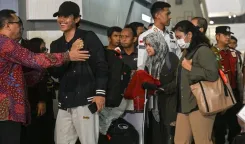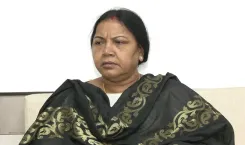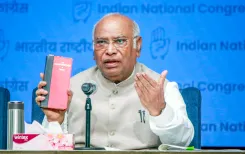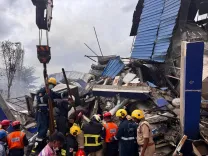Why Is a Hindu Woman in Bangladesh the Victim of Gang Rape by a Local Politician?
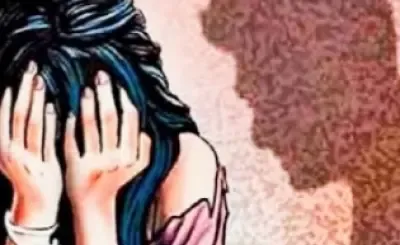
Synopsis
Key Takeaways
- Gang rape of a Hindu woman in Cumilla highlights systemic issues.
- Five suspects, including a local politician, have been arrested.
- Human rights organizations criticize law enforcement's handling of the case.
- The incident reflects a pattern of violence against minorities in Bangladesh.
- Public and media attention is crucial for justice.
Dhaka, June 30 (NationPress) In a deeply troubling episode highlighting the violence against minorities and the rampant atrocities facing women in Bangladesh, a Hindu woman was subjected to a horrific gang rape within her own residence in the Cumilla district. Her assailants not only attacked her but also recorded the brutal incident and disseminated the footage, as reported by a human rights organization on Monday.
To date, authorities have apprehended five suspects, including the primary perpetrator, Fajar Ali, a member of the Bangladesh Nationalist Party (BNP).
The Human Rights Congress for Bangladesh Minorities (HRCBM) condemned the actions of the assailants, stating that they circulated the video of the appalling incident as if it were a trophy of war.
"On the night of June 26, 2025, a Hindu woman in Muradnagar, Cumilla District, faced a level of violence that is beyond comprehension: her home was invaded, her dignity violated, and her trauma was recorded and shared like a war trophy. She was gang raped by multiple attackers, her cries resonating through a country that has, for decades, ignored the plight of its most vulnerable," the HRCBM declared in a statement.
The human rights organization further criticized law enforcement for their failure to conduct a timely medical examination, delaying the filing of her First Information Report (FIR) until June 29, and later shifting responsibility by suggesting it was "up to her" to seek medical treatment.
The HRCBM pointed out that the significant delays in filing the FIR, the absence of a medical examination within the critical first 24 hours, and the dismissive attitude towards the survivor's rights indicate a troubling pattern of "systemic negligence." They emphasized that suggesting the survivor should arrange her own medical care constitutes a "gross violation of procedural and ethical standards."
Despite public outcry and attempts by Islamist groups to manipulate media narratives portraying the crime as consensual, one main perpetrator and several accomplices involved in sharing the assault video have been arrested. However, many others remain unaccounted for.
In video statements received by the organization from members of the local Muslim community, some attempted to downplay the severity of the incident and shield the main accused, Fajar Ali, and his associates, despite the "brutal nature of the assault."
Such behavior from community members, the HRCBM stated, "hinders justice and fosters the normalization of gender-based violence against minorities."
"This incident is not an isolated case. It exemplifies a disturbing trend in Bangladesh where minority women are consistently targeted for rape, abduction, forced conversions, and silencing," they noted.
According to the HRCBM, since April 2025, there have been 13 documented cases of gang rape involving Hindu women in Cumilla District alone. Reports of decapitated bodies, mass abductions, and forced conversions of young minority girls are also surging alarmingly across the nation.
"Families regularly reach out to HRCBM, desperately asking for help to rescue their daughters," the organization stated.
The HRCBM also criticized major Bangladeshi media outlets for their largely muted response. They pointed out that the Muradnagar case, akin to many others, would likely have been "swept under the rug of political denial and communal pressure" if not for the viral spread of the assault video, which forced public and institutional scrutiny.
The HRCBM is preparing to file a Public Interest Litigation (PIL) demanding a judicial review of the conditions faced by minority women and girls in Bangladesh.
Simultaneously, it has urged the international community – including UN agencies, human rights advocates, and global civil society – to back its initiatives, pressuring the Muhammad Yunus-led interim government and advocating for accountability mechanisms.
In a statement condemning this abhorrent incident, Bangladesh Students League President Saddam Hussain remarked that in a nation increasingly resembling a "fascist Islamist regime," the voices of women and Hindu minorities in Bangladesh continue to be ignored.
He stressed that with each passing day comes another harrowing tale of "temples desecrated, families uprooted, and daughters brutalized."
"The latest horror emerges from Cumilla, where a young Hindu mother of two was raped at knifepoint by Fajar Ali and his accomplices. He is known to be an active member of the Bangladesh Nationalist Party (BNP), a party with a long-standing and controversial history regarding its treatment of religious minorities," he shared in a post on X.
"Her nightmare did not end there; they recorded the assault and continued to mercilessly beat her. The video, which is too disturbing to share, serves as a grim reminder of the escalating violence and persecution faced by Hindu women and minorities in Bangladesh," he added.
"Her only offense: being a Hindu woman in a land where religious identity has become a target. As the nation turns a blind eye and justice remains elusive, the question arises: How long will the Hindu community and women in Bangladesh be forced to live in fear? What more must they endure before the world takes notice?" he concluded.



